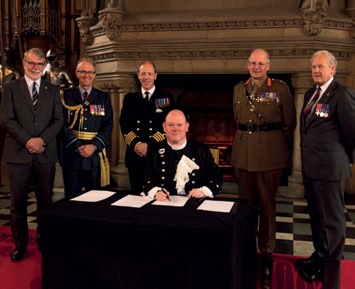Supporting armed forces, families and veterans
In the month of Remembrance, Thomas Baldwin considers how congregations have responded to the Armed Forces Covenant.
FIVE years after the Church of Scotland signed up to the Armed Forces Covenant, congregations are being invited to consider how they are responding to the needs of serving personnel, veterans and forces families.
The 2017 General Assembly approved the church’s adoption of the Covenant, which states that ‘those who serve in the Armed Forces, whether Regular or Reserve, those who have served in the past, and their families, should face no disadvantage compared to other citizens in the provision of public and commercial services. Special consideration is appropriate in some cases, especially for those who have given most such as the injured and bereaved’.
Following the decision the then Moderator, the Very Rev Dr Derek Browning, signed the Covenant on behalf of the Church of Scotland in a ceremony at Edinburgh Castle.
The Rev Scott Brown, the new convener of the Committee on Chaplains to HM Forces, says: “It’s a covenant between the people of the nation and those who serve or have served in the forces and their families. It’s about fairness in access to healthcare, fairness in access to housing, fairness in in access to services – that type of thing. “Because in military life you move around, your life is in constant flux and you don’t get to put down roots. So for example, you’ve moved around 16 bases in England in the last 12 years, and you arrive back in Perth and you don’t know anybody, and you don’t know a GP, and you don’t know a dentist. It’s trying to redress some of those things, and it’s about trying to make sure that’s fairly done for those across the services community. Not saying they get an advantage over everyone else, but that they are fairly treated.”
The covenant signed by Dr Browning urged ministers to signpost members of the Armed Forces communities to appropriate resources, and presbyteries to appoint veterans’ champions to support ministers and strengthen connections between the church and veterans’ groups.
However, Mr Brown admits that exactly how those commitments will manifest themselves at the local level is still to become clear. He says: “We signed up saying we would look out for personnel and veterans and their families in our church communities - because they are there, they worship with us week by week.
“But what the effect is in reality, I don’t know. Some presbyteries have armed forces champions and some don’t, and we’re waiting for some of the new presbyteries [which will come into being through the current programme of presbytery mergers]. But I’m hoping that there will be an armed forces and veterans’ champion in every presbytery moving forward, and if we could get the new presbyteries to sign up to the Armed Forces Covenant that would be a positive thing too.

Rt Rev Dr Derek Browning signing the Armed Forces Covenant
“The support for the armed forces is certainly there and always has been, but I think it would be seen in small acts rather than anything on a larger scale. I know that some congregations close to military bases will have a local link - so maybe one of the churches in Lossiemouth will have a close connection to RAF Lossiemouth, or Leuchars (in Fife) or Fort George (Inverness). But other than that, for the ordinary veteran sitting in the pew in city centre Glasgow or Edinburgh, what the benefit of the Covenant to them is I just don’t know.
“But maybe it’s our job as a committee to remind churches that the Covenant is there and invite congregations to reflect on how they are responding to it in their local situation.” ¤